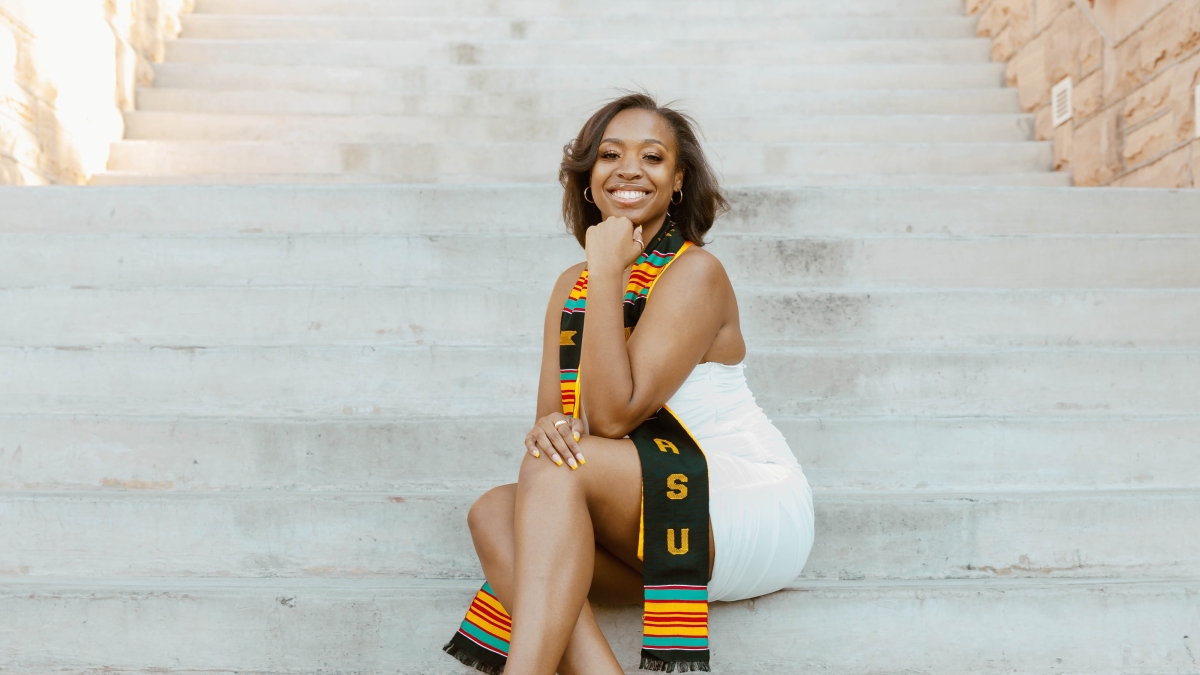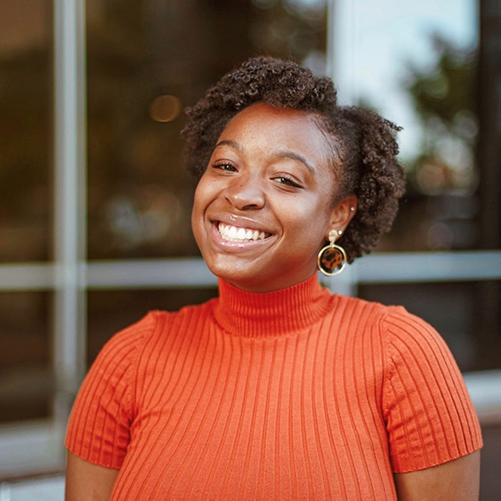ASU honors graduate packed her schedule with academics, leadership and service

Elon Graves is graduating with a bachelor's degree in journalism and mass communication with a public relations focus, a cross-sector leadership certificate, and honors from Barrett, The Honors College.
Editor's note: This story is part of a series of profiles of notable spring 2021 graduates.
Elon Graves knows that you have to run a lot to accomplish what you want as an Arizona State University student. Run, literally — as in campus to campus, class to class and activity to activity.
But Graves, who is graduating this spring with a bachelor’s degree in journalism and mass communication with a public relations focus, a cross-sector leadership certificate, and honors from Barrett, The Honors College, is proud of her ability to move fast — both intellectually and physically.
“I definitely have been seen running across both the Tempe and Downtown (Phoenix) campus to get to the shuttle bus or light rail. I would pack my schedule and have meetings, class or practice to get to. Often I would run in heels — like running-running in heels — and barely did I ever miss the bus and make myself too late to where I needed to go. I never had a car during my time at ASU so I will always be thankful for those transportation methods,” she said.
With all of her jobs, community involvement, service and coursework, it’s no wonder Graves was on the run.
She was a founding member of the Black Student Union Downtown in 2019 and served as the organization’s vice president.
“I connected with amazing members of the Black community on campus. It was an honor and so much fun to create a space of inclusivity and safeness for students or color,” she said.
In spring 2020, she won a Pitchfork Award for Most Outstanding Undergraduate Student Leader on the Downtown Phoenix campus. By then she had been a leader at the Sun Devil Fitness Center Downtown, Black Student Union Downtown, Sun Devil Leadership Coalition, the PR Lab at the Walter Cronkite School of Journalism and Mass Communication, Next Generation Service Corps, and the ASU Hip Hop Coalition. Hence the running from campus to campus.
During the first semester of her senior year she was working 40 hours a week between her jobs at Valleywise Health Foundation and ASU’s Media Relations and Strategic Communications office.
She did this while taking 18 credits, volunteering with Next Generation Service Corps and perfecting her dance craft.
"I busted my butt and learned so much from each job,” she said.
She also completed an honors thesis focusing on diversity and inclusion in sportswear companies.
“The pandemic in 2020 impacted the nation both physically and socially. Media and social media interactions became more prevalent. Social media users called on big companies to respond and make a difference," she said.
“My research analyzed and evaluated the marketing and communication strategies of these companies to effectively execute diversity and inclusion as a business practice. I came to the conclusion that Nike used and implemented effective strategies, while Adidas and Puma could improve on how they visually represent diversity and inclusion,” she explained.
We asked Graves, whose hometown is Marietta, Georgia, to take time out to reflect on her time at ASU. Here’s what she had to say:
Question: What was your “aha” moment when you realized you wanted to study the field you majored in?
Amswer: I was the editor of my high school newspaper, and I love telling stories that hadn’t been told yet. When I began at the Cronkite School I thought I wanted to continue down the journalist path. I soon realized through taking classes at Cronkite that my passion wasn’t just about telling stories but representation. I wanted to help brands and people effectively tell their stories so they could positively influence the world. That discovery led me to PR.
During this time I contemplated changing my major, and even thought about doing a minor in dance, but once I understood the value of public relations I knew that’s what I needed to study.
Q: What’s something you learned while at ASU — in the classroom or otherwise — that surprised you or changed your perspective?
A: While at ASU I realized how important it is to build your professional network. The people, places and things you surround yourself with can influence how you see the world and your success. I realized I also shouldn’t be afraid to ask for help or advice from my peers, professors and bosses. You should have people in your corner who will support you and tell you the truth. Your network may change over time, but you never know what small or simple interactions could change your future.
Q: Why did you choose ASU?
A: I was the editor of my high school newspaper, coincidentally called The Pitchfork. We were the Marietta Blue Devils. My high school newspaper adviser, Andrea Lyons, told me about the Cronkite School, one of the best journalism schools in the nation. I came on a tour by myself to Arizona on one of the gloomiest days ever but I met incredible people from one of the first cohorts of Next Generation Service Corps. They shared with me how my knowledge and passion for creating a positive impact could evolve even more through the program. So after a tour on campus and a confirmation of my scholarship package, I chose ASU. Then for one of my last articles as editor, I wrote about how I was going from a Blue Devil to a Sun Devil. I may not admit it but I have a lot of school pride.
Elon Graves
Q: Which professor taught you the most important lesson while at ASU? What was that lesson?
A: I don’t think I have one professor who taught me the most important lesson, but I think collectively they instilled the value of confidence. They reinforced that if you work hard and own it, you will find success in the right places. My professors taught me to set goals and aim high because either way I would grow if I remained confident.
Q: What’s the best piece of advice you’d give to those still in school?
A: Spend time on the things you love. There are so many opportunities to try different things but once you find something that means the world to you, work hard in that area. Don’t waste your time on people, places or things that don’t fulfill you and push you toward your goals. And, always remember your journey is unique to you. It won’t look like anyone else’s, so embrace your own failure and success because it will only help you be a better you.
Q: What was your favorite spot on campus, whether for studying, meeting friends or just thinking about life?
A: My favorite spot is the Sun Devil Fitness Complex downtown. I’ve met some of my greatest friends there, made memories with my clubs, taught dance classes and worked there for two years. The rooftop pool is the best to hang out with friends, study and think about life. My freshman year I loved working out and going to the pool to swim after. Not to mention the views at sunrise and sunset in the middle of downtown Phoenix are beautiful. Also, a shout out to Courtney Spivak Smith for being one of the best bosses ever.
Q: What are your plans after graduation?
A: After graduation, I am continuing my work with Valleywise Health Foundation as a marketing and communications specialist. I am moving to Los Angeles and working remotely. I also plan to pursue my dance dreams while in LA.
Q: If someone gave you $40 million to solve one problem on our planet, what would you tackle?
A: I would address homelessness affecting communities of color in cities in the Los Angeles area: $40 million wouldn’t solve the problem, but it could help to build more shelters, develop programs for youth, and create access to better health care. I would target youth and young adults to provide stability, access and awareness for their next chapter in life.
More Law, journalism and politics

Exhibit uses rare memorabilia to illustrate evolution of US presidential campaigns
After one of the most contentious elections in history, a new museum exhibit offers a historical perspective on the centuries-old…

TechTainment conference explores the crossroads of law, technology, entertainment
What protections do writers, actors, producers and others have from AI? Will changing laws around name, image and likeness (…

How to watch an election
Every election night, adrenaline pumps through newsrooms across the country as journalists take the pulse of democracy. We…
